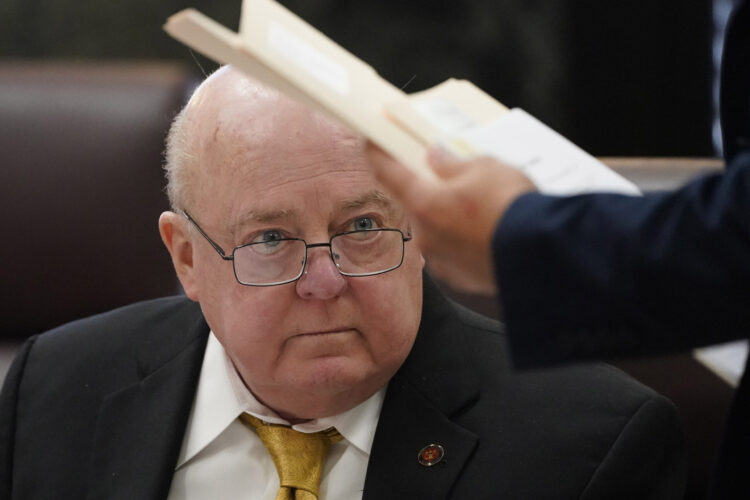
Chairman John Polk, R-Hattiesburg, glances up at a completed committee report that he is proof reading in the Supreme Court Chamber at the Capitol in Jackson, Miss., Monday, March 29, 2021. (AP Photo/Rogelio V. Solis - Copyright 2021. The Associated Press. All rights reserved.)
The legislation would allow citizens to propose ballot initiatives to enact state law but not constitutional amendments.
The Mississippi Senate has moved forward with the only vehicle this year to codify a form of the ballot initiative process for Mississippi residents.
The original initiative process came into question during the push for Initiative 65, which would have legalized medical marijuana. After a majority vote of electors, the initiative was challenged in court based on how it was certified using the process of collecting signatures under the old five congressional districts. Mississippi now has four congressional districts. Ultimately, the Mississippi Supreme Court ruled that it was improperly certified, which overturned the initiative and nullified the current initiative process.
The Senate proposed two bills to restore a semblance of the process. SCR 533 and SB 2638, which must be passed in tandem, would create a new ballot initiative process. However, probably the biggest difference is that it would not allow any modifications to the State’s Constitution. Only statutory changes could be proposed by the public.
The new resolution sets forth:
- No constitutional changes will be considered, only statutory.
- It cannot change local or special laws.
- A fiscal analysis from the chief legislative budget officer must be prepared for each initiative.
- It requires 12 percent, or roughly 240,000, of the total qualified electors in order to propose an initiative. Those numbers must then be divided by the current number of congressional districts.
Any initiative must be filed with the Secretary of State’s office and shared with both the House and Senate. The Legislature will have the authority to amend or offer an alternative initiative by a two-thirds vote of each chamber. However, if no action is taken on it, the initiative will go to the ballot in the next statewide general election.
SB2638 states that no more than two ballot initiatives can be submitted per ballot and if one is not approved by voters, that topic cannot be addressed again for a minimum of five years. But SCR 533 as amended allows for five initiatives per ballot.
There is a reverse repealer in the bill, meaning the chamber will see these measures again prior to the end of the session.
State Senator John Polk (R), the Senate Accountability, Efficiency, Transparency Committee chairman, explained to the chamber that due to several bills dying in the House, SCR 533 is the only vehicle alive to address the ballot initiative process.
“I have had no discussions with the Chairmen of the House committees in which the ballot initiatives were sent to,” said Polk. “I have no idea what the House’s intentions are. I would say that the bill before you today is a good start.”
Based on the state’s Supreme Court reasoning behind its ruling on the prior initiative process which deemed it unconstitutional, Senator Derrick Simmons (D), the Senate Minority Leader, questioned why the Legislature would not just correct that problem without creating a different process.
“If I recall from that ruling the court declared that we had changed our congressional districts and it was not properly reflected in the four districts as opposed to the five districts when we actually first enacted the ballot initiative process,” said Simmons. “I have one simple question, why wouldn’t we basically put in statute what we had in the constitution? Incorporate the ruling of the Supreme Court and just change the districts?”
Senator Polk said his intentions were to restore a statutory process, but not one to provide for changes to the State Constitution. He also said there needs to be an ability for change to a ballot initiative within the Legislative body.
“After seeing the debacle that could have happened with the medical marijuana proposal, Mississippi does not need a constitutional amendment process by the people separately,” said Polk. “If we had passed the medical marijuana, if it had not been ruled unconstitutional, it would have been even more disastrous than what we are facing right now with inabilities for state agencies to perform.”
Prior to the ruling, ballot initiatives would have changed the state constitution. Any further changes to those initiatives would have required another ballot initiative with a two-thirds vote of the people, which can be a lengthy process.
Polk’s stance is that those options do not need to be available. He said ballot initiatives often bring in outside funding and ideals which influence voters improperly.
Senator Simmons said the way in which this bill sets up the process causes him to be concerned about fair representation for the public when the Legislature does not act in their interest.
The amended resolution will require another two-thirds vote on the bill.
Senator Barbara Blackmon (D) proposed an amendment, appealing to the members that they should trust the public to think for themselves when it comes to matters that they would like to see on the ballot, and allow for constitutional provisions to be allowed. It failed.
“The fear is that this process is going to get abused. That we are going to have crazy stuff on the ballot, people don’t know what they’re doing, they’ll vote for any fool’s thing,” said State Senator David Blount (D). “The fear is misplaced based on the history we have seen.”
Blount went on to add that in the 30 years that the ballot initiative process has been operating, only three measures have been approved by voters under the existing process. Those include eminent domain, medical marijuana, and voter ID. Under the proposed process in SCR 533, Blount said only eminent domain and medical marijuana would have passed.
Blount did agree with Polk that this should be a statutory process, and that some provisions like medical marijuana do not need to be in the state’s constitution. However, he believes it has to be accessible.
“We have to negotiate in good faith that is as close as possible to the process they had for 30 years,” said Blount. “I hope we get something out of conference that we can all vote for. I urge you to vote for the resolution.”
Polk, who was among 4 Senators who did not vote for the resolution, closed on the bill saying that times have changed in 30 years and the people my need a different process.
The resolution and accompanying bill now move to the House for consideration and will likely go to conference, where Polk says the bill could look completely different. The issue took a similar path last year before it died, with the chambers split over the number of necessary signatures needed to put an initiative on the ballot.











